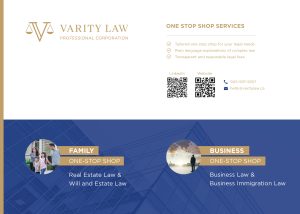Since COVID-19 started, we did a lot of probate applications for our clients. Throughout the process, whether or not the family did estate planning means heaven or hell for their beneficiaries.
In summary, having a Will means:
- The estate will be distributed according to your wishes rather than according to estate legislation – usually means no dispute, no litigation;
- Court will unlikely require a bond policy – those policies are very expensive and can cost 2-5% of the entire estate;
- Probate application processing time will be much shorter – when there is a Will, we are seeing approval within 1 month vs. probate without will 6 months and up
- With proper estate planning (shown below), your beneficiaries can avoid a lot of income taxes and probate taxes payment
- You can have a plan for your estate debts – otherwise, all the debts will be due immediately after you pass away – your beneficiaries cannot continue monthly payments of mortgages, for example, they must pay it back all at once
- Assets given through a Will can be protected against divorce – the beneficiary’s spouse cannot claim it unless it is a matrimonial home.
It may sound complex, but not to worry – we will use 2 examples to show you how this works.

Case Study: When a Family have a Will and an Estate Plan
Lucy and Louis are married to each other and have one principal residence A and two investment properties. They hold title as joint tenants on the principal residence. Only Lucy’s name is on investment property B, and only Louis’s name is on investment property C.
They have two children, and they want evenly to distribute their estate to them. They came to Varity Law, and we did a suitable estate plan for them:
The Capital Gains Problem
- First, the principal residence A will be passed down according to joint tenancy – this means, if Lucy or Louis passes away, the property will be automatically passed down to the surviving spouse – there is no need for will or probate application to the court; but if they both pass away, the property will be passed down to their children according to the Will we drafted for them;
- In Canada, when principal residence is sold, there is no taxes; but when investment property is sold, there will be taxes called capital gains;
- So, the children can each receive one investment property from their parents – which can then be the child’s own principal residence – when they sell it, there would be no taxes;
- But if they were to also receive their parents’ principal property A, then A would become their investment property – taxed when they sell it;
- Instead, they could leave A within the estate – and sell it as the principal residence of the estate of Lucy and Louis – when this is sold, there is no taxes – and when they inherit the sale proceeds as beneficiaries, there would be no income taxes.
The Mortgage Problem
- There is a mortgage on both investment properties;
- Although houses can be passed down according to a Will, mortgages cannot be inherited – because the children have different income than their parents – they do not qualify for the same mortgage;
- Fortunately, we mentioned this to Lucy and Louis, so they left some assets that are automatically transferred to the children upon their death – meaning their children can receive those immediately after they pass away without a will or probate application;
- Those assets include life insurance, RRSP, and TFSA with designated beneficiaries;
- The children used money from those sources to pay off the mortgage immediately (and thus avoiding any mortgage penalties due to delayed payment), and then after probate application is approved, they successfully received the investment properties.

Case Study: No Will and No Estate Plan
Joe and Jolin also have one principal residence A and investment properties B and C.
However, Joe and Jolin did not have a Will and did not make an estate plan.
Therefore, when their children came to our law firm, we could only apply for Probate without a Will. They had to wait for an entire six months before the Court approved the probate application, since there is no will. During these six months, the mortgages on the investment properties remain unpaid, and the banks charged a lot of interest penalties, and threatened to do power of sale if there is no payment plan.
According to the Mortgages Act, R.S.O. 1990, c. M.40, the lender can start power of sale as soon as the borrower misses payment for 15 days or more. Also, since the children cannot inherit the mortgage, just continuing with monthly payments is not enough – they must find a way to repay back the entire outstanding mortgage all at once.
As the children did not have the means to pay off the mortgage, they had to sell the properties:
- First, under our advice, their sold the parents’ principal residence A in the estate’s name – meaning there is no capital gains tax;
- Then, they had no choice but to sell the two investment properties and use the sale proceeds to pay off the mortgage and its penalties;
- Then, they also had to pay off the probate taxes and the capital gains taxes from the investment properties;
- Finally, the left-over money they could split evenly according to Succession Law Reform Act, R.S.O. 1990, c. S.26

Conclusion
In summary, having a Will and not having a Will makes a world of difference to your beneficiaries, especially if you are a homeowner.
As well, it is not the case that you can write a Will at any time. In fact, a valid Will can only be written when:
- The testator (person making the Will) is of sound mind (not unconscious or confused, such as due to older age);
- The testator must sign the Will in front of two witnesses who are not beneficiaries or their spouse;
- One of the witnesses must swear an affidavit in front of a lawyer;
- The testator must ensure that the assets in the Will are his/her to give (e.g., you cannot give your entire company to your children if you only own 50% of it, or if there is share transfer restrictions in place).
Evidently, an estate plan should be made as soon as possible, to avoid many expenses and pain & suffering from your beneficiaries.
Please note that this article is only meant to provide general legal information, not specific legal advice that fits with your situation. If you have specific questions, please book a first free consultation with us by clicking HERE.







